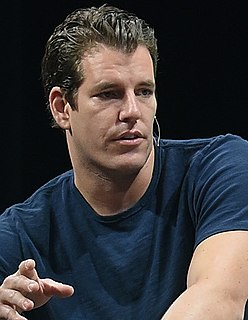A Quote by Peter Sunde
Facebook brings the Internet to Africa and poor countries, but they're only giving limited access to their own services and make money off of poor people. And getting government grants to do that, because they do PR well.
Related Quotes
More paper money cannot make a society richer, of course, – it is just more printed-paper. Otherwise, why is it that there are still poor countries and poor people around? But more money makes its monopolistic producer (the central bank) and its earliest recipients (the government and big, government-connected banks and their major clients) richer at the expense of making the money's late and latest receivers poorer.
The great question for our time is, how to make sure that the continuing scientific revolution brings benefits to everybody rather than widening the gap between rich and poor. To lift up poor countries, and poor people in rich countries, from poverty, to give them a chance of a decent life, technology is not enough. Technology must be guided and driven by ethics if it is to do more than provide new toys for the rich.
It's amazing to me how many people think that voting to have the government give poor people money is compassion. Helping poor and suffering people yourself is compassion. Voting for our government to use guns to give money to help poor and suffering people is immoral, self-righteous, bullying laziness.
A considerable proportion of the developed world's prosperity rests on paying the lowest possible prices for the poor countries' primary products and on exporting high-cost capital and finished goods to those countries. Continuation of this kind of prosperity requires continuation of the relative gap between developed and underdeveloped countries - it means keeping poor people poor. Increasingly, the impoverished masses are understanding that the prosperity of the developed countries and of the privileged minorities in their own countries is founded on their poverty.
Not so great in England at the moment; in an online poll we came last, we actually came bottom of European countries for quality of life, because of things like the weather, obviously, late retirement, poor holiday, poor public services, poor health service; it's basically just a kind of grey, godless wilderness, full of cold pies and broken dreams.
Poverty assumes so many aspects here in India. There aren't only the poor that you see in the cities, there are the poor among the tribes, the poor who live in the forest, the poor who live on the mountains. Should we ignore them as long as the poor in the cities are better off? And better off with reference to what? To what people wanted ten years ago? Then it seemed like so much. Today it's no longer so much.
If the "rich" were swarming into poor neighborhoods and beating the poor until they coughed up the dimes they swallowed for safekeeping, yes, this would be a transfer of income from the poor to the rich. But allowing taxpayers to keep more of their money does not qualify as taking it from the poor - unless you believe that the poor have a moral claim to the money other people earn.



































